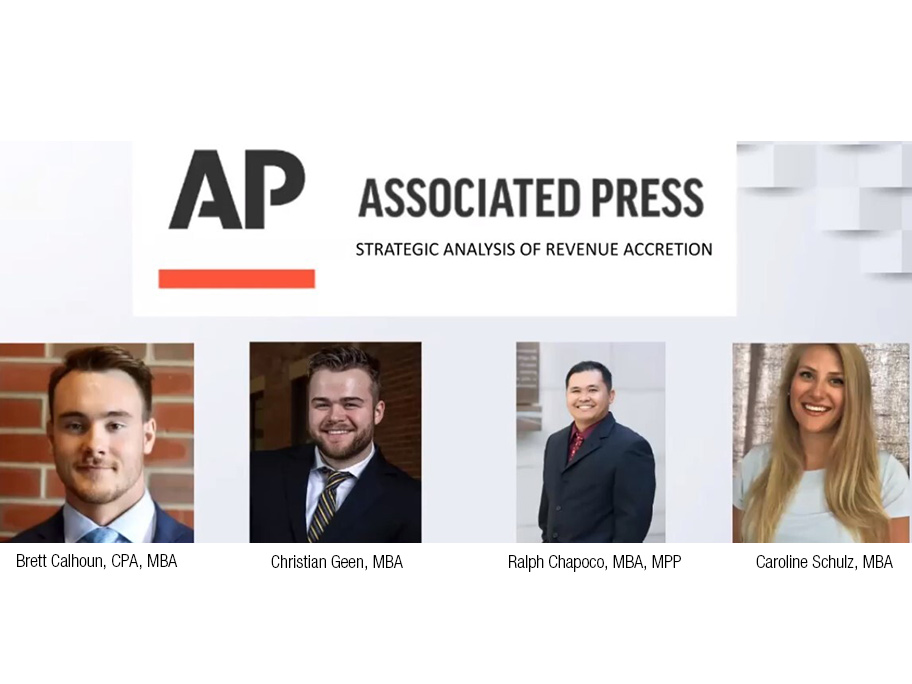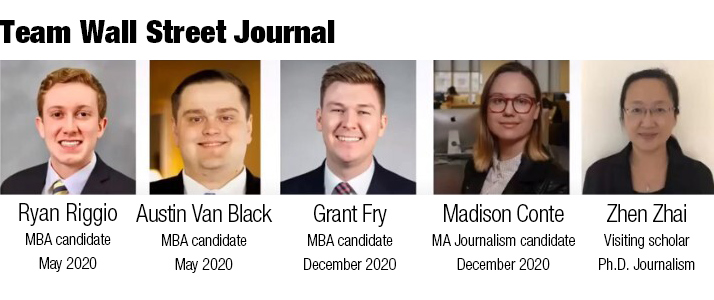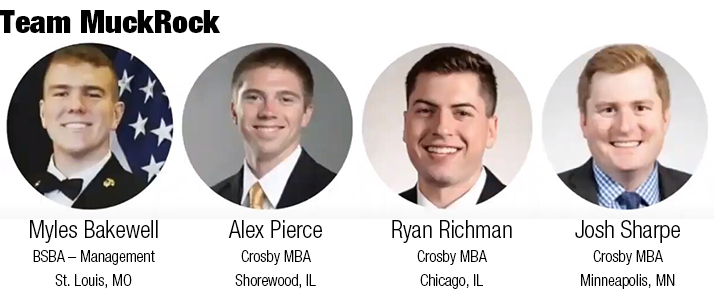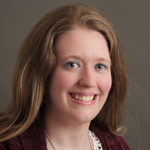
Entrepreneurship and Media of the Future winner creates online learning platform for journalists
Coronavirus requires team to shift project focus midway through project
A University of Missouri student team, who came up with the idea to teach different journalistic skills through an online subscription-based learning platform, won the 11th annual Entrepreneurship and Media of the Future Symposium competition. The team created the idea for The Associated Press.
The competition brought together graduate students from the Missouri School of Journalism and Trulaske College of Business to tackle various challenges from industry clients. This year, student teams worked with The AP, The Wall Street Journal (2nd place) and MuckRock (3rd place).
The students worked on the projects for their Entrepreneurship and Media of the Future class taught by Professor Randall Smith, Donald W. Reynolds Endowed Chair in Business Journalism. Their final ideas were then shared with clients last week during a livestream of the virtual symposium. More than 200 viewers watched the event, with an additional 640 watching the recorded event.
“Through teamwork and extensive research, Team AP created a well-defined prototype for an online course and certification product platform, using the AP Stylebook as the foundation for subscription-based, journalism-related classes,” said Katherine Sandler, manager of partnerships at The AP. “The ideas they developed couldn’t be more applicable to today’s online world. I’m pleased with the team’s process and results — they did a remarkable job.”
Team AP consisted of Brett Calhoun, business; Ralph Chapoco, journalism; Christian Geen, business and Caroline Schultz, business. Professor Smith mentored them.
According to the team, journalists could learn various skills through the platform such as interviewing, writing, fact-checking and technical skills, among others. The team proposed a subscription-based model for the platform with various prices to meet the needs of different budgets.
During the project, the student team consulted with 2017–18 RJI Fellow Linda Austin, project director for NewsTrain, a touring workshop for the Associated Press Media Editors, who created a mobile-learning program during her fellowship that offers digital journalism learning sessions in bite-size chunks.
“She was instrumental in helping us to understand how our product should work, as well as the market (for this type of product),” says Chapoco, a graduate student from San Diego studying data journalism.
The students originally were tasked with coming up with an event to create a new revenue source for The AP. However, because of COVID-19 and social distancing, they knew they needed to look at other revenue opportunities.
Geen said they saw a demand for e-learning that is continuing to rise. He shared the example of LinkedIn, which has opened up 25 virtual workshops in its LinkedIn learning service.
“The uniqueness of The AP team’s ideas stood out to the judges,” says Robert Jones who was one of the judges for the competition and a doctoral candidate at the Missouri School of Journalism. “We were very impressed by the timeliness of the idea — e-learning in the wake of current social conditions. We also were impressed by the wherewithal they showed when they pivoted away their original idea and challenge. Those factors separated them from the other groups in our opinion.”
The judges’ criteria for the competition judging included: concept explanation and quality; presentation of the goal; stakeholder solution; sustainability; communication skills and ability to engage judges, as well as fielding questions.
Throughout the semester-long project, journalism students learn skills to help them as they prepare to enter the industry. Chapoco said this project and class reminded him about the sense of the importance of the business side of a news outlet, as well as the narrative side of telling people’s stories.
“There are revenues and expenses that need to be considered, and that is as important as it is to inform the public about information, there has to be a business model that will make that possible,” says Chapoco.
“Understanding that, and knowing that, makes me a better journalist.”
The other two student teams in the competition were:
Team Wall Street Journal

The team was asked to help The Wall Street Journal redesign and revitalize personal finance how-to guides for the 18 to 35 year old demographic.
The team consisted of Madison Conte, Grant Fry, Ryan Riggio, Austin Van Black and Zhen Zhai. Les Borgmeyer, vice president of sales and marketing for Visionworks Marketing Group, mentored them.
Team MuckRock

The nonprofit newsroom Muckrock asked the team to help them as they look for a way to make their rudimentary crowdsourcing tool and crowdfunding tools succeed in a way that helps newsrooms around the country grow and sustain their operations.
The team was made up of Myles Bakewell, Alex Pierce, Ryan Richman and Josh Sharpe. J. Scott Christianson, an assistant teaching professor of management at Trulaske, mentored them.
The symposium was sponsored by the Center for the Digital Globe.

Comments